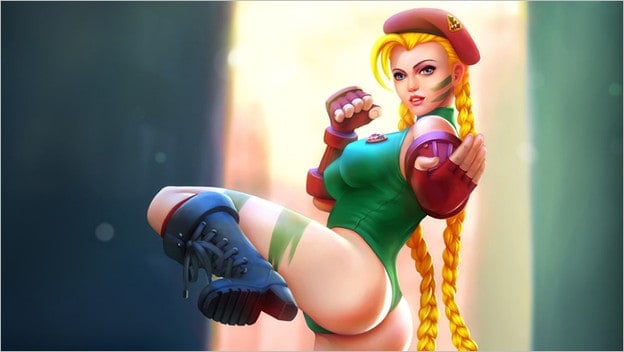Proving once again the rising power of its brand, the EVO 2017 Street Fighter V Grand Finals aired on ESPN 2. Obviously ESPN 2 is the weird offshoot that not everyone has, but it’s still a milestone event and an advancement on the evolutionary path of video games to the full mainstream assimilation the industry so desperately wants. But of course, there was drama.
One player in the finals plays Cammy, a character who debuted in Super Street Fighter 2 and has been a regular in the series since. She wears a leotard, which often ends up basically being a thong or as close as it can be to a thong while still being considered clothing. After a round, an official approached the player and asked him to change costumes. The rest of the match saw Cammy sporting one of the much less revealing costumes. ESPN later confirmed the decision, citing broadcasting standards as the reason.
Of course, there has been a whole thing on the Internet about this. Much of the community is upset about the decision, seeing it as censorship or ESPN being out of touch, some kind symbol of interference in the generally wild west world of video games. This is also, of course, happening at a time in history many have dubbed the “culture wars,” an era of cultural osmosis, wherein more and more different kinds of voices are gaining more and more access to the broader conversation. As technology cheapens and as platforms like social media expand, diversity happens. Many embrace it and many fight it, especially within those spaces. What I’m saying is, I can look at a comment section for an article on this, search “SJW,” and bury my face in my hands when I see the number I come up with.
Here’s the thing. Businesses want to make people happy. They want to make the maximum number of people happy within their targeted audience and bring in the maximum number of dollars. Twenty years ago, pushing the envelope was the thing to do. Tons of TV spaces were all about getting away with as much as possible, and the TV watching demographics, largely young men, soaked it up with glee. That explains things like the Attitude Era in wrestling, Howard Stern, and the rise of HBO.

But that’s not what the audience landscape looks like anymore. Spaces like TV and movie theaters are more family-friendly than ever, and social consciousness also plays a part in playing on-screen content safe. Of course, this has also led to premium service markets pushing the envelope even further, but in smaller, safer spaces like Netflix and HBO, places that can afford to cater to hardcore, but smaller audiences.
This is why a channel like ESPN is going to raise an eyebrow about mild nudity in a video game, in a space that’s supposed to be the grand finals of a huge competitive tournament. Something presenting itself as the esports equivalent of the superbowl. EVO and esports in general want legitimacy. Onscreen cheesecake pointing back to the 90s is got going to bring legitimacy. It isn’t going to bring bigger spaces with more exposure, more advertising dollars. Look at my earlier example in wrestling. Wrestling is largely family-friendly now, when it was the harbinger of edge not so long ago. Today, being accessible is how you succeed.
